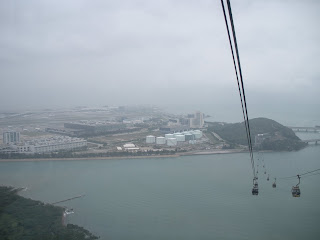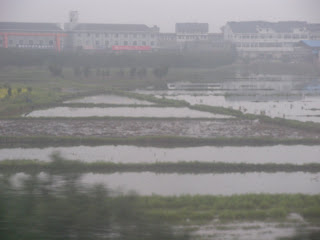I spoke at a required junior night at an international school in Hong Kong, which was attended by students and parents. The topic was "how to choose a college." It was organized by the counselor who works with students on college applications, and included an alum, a recruiter from the University of British Columbia (they have a staff of 6 in Hong Kong), and myself. I spoke on "why choose a private liberal arts college, and a private Christian liberal arts college."
This was an incredibly tough audience. Some of the points I emphasized were: Private liberal arts colleges have a long tradition in the U.S. going back to Harvard. They are very strong academically, provide opportunities for students to have full professors teach them and for them to do research with faculty that will be published. Such college focus on the undergraduate program (no graduate students) and have small classes, providing a better learning environment. Because of these characteristics and their fostering of critical thinking skills and a breadth of knowledge, they have a tradition of training students who become societal leaders. They also have high success in sending students into Ph.D. programs and professional schools.
This school is an intentionally Christian school where families and students must be committed to a Christian faith. So I also talked about why a Christian liberal arts college could be a good choice. The educational philosophy and environment is build on shared Christian values. This allows faculty to encourage students to ask hard questions with the knowledge that the other students and faculty share Christian commitments. Students grow in their understanding of the Christian intellectual tradition which involves reading about what Christians have written and thought about particular crucial issues--war, government, life and death, etc. Opportunities are provided for individual spiritual growth and corporate worship. Underlying all of this is an education philosophy that is concerned with the wholistic development of students--spiritual, academic, moral, and physical. Students are thus challenged to not just prepare for "jobs" but to ask the question, "what is God calling me to to?"
Wouldn't all parents want such rich environments for their children if they thought it was a good fit? And cost is not the issue since they are all going to pay out-of-state, province, country tuition rates!
But this vision of education is a hard sell in Hong Kong, even within the Christian community. The view of the crowd was quite evident when one parent asked, "How do you go about choosing a college?"
My response was to have discussions with your son or daughter over what would be a good fit--urban or rural, big or small, what types of programs, etc. Where would they thrive?
The parent then said, "but what is you want to hold out for the dream college?" The school counselor quickly responded with: "A college where your child thrives is their dream college."
Afterward, most quickly went up to the UBC recruiter (a world class university). One young man quietly came up and told me he was intrigued by the idea of a Christian liberal arts college. I gave him my card and he quickly disappeared into the crowd.
This is a very hard place to recruit because parents are determined to send their children to big, high status universities--names that people recognize--and really don't care about "fit" for their children. It is all perceived status. I was struck by the impoverishment of this perspective. Children are not allowed to talk about their needs. Parents are not allowed to focus on what kinds of people they want their children to become, but rather only on their "success." There is no grace--children are not allowed to fail to meet expectations. If they are unhappy when they are away at university, they cannot say it. And, in spite of their being Christians, a life of service to community and others, does not seem to be within the acceptable range of options.
This cultural perspective of course, is seen throughout society here. This is why business runs government and the non-profit sector is not very strong. Family obligations are primary and these obligation involve this narrow view of success.
I recall when my daughter Marie was 1 year old, we were invited to a child development class so the class could see an example of what a one year old was like. Of course, she was in no way a typical one year old. Instead of holding on to me, she proceeded to turn the classroom upside down by tearing through everyone's backpacks. But that is another story...
In that class, a student asked me WHAT I wanted Marie to be when she grew up. I was so stunned by this question that I didn't have much of a chance to answer. I had only thought about WHO I wanted her to be--a Christian who portrayed spiritual values such as compassion, service to the poor and suffering, and desire for justice, and lived her life in such a way as to make a positive contribution to society. This desire for both my daughters comes out of my Christian commitment. But in Hong Kong, even within Christian circles, this type of desire for daughters and sons is muted. Even those that might wish this for their children have a difficult time finding an outlet for expressing it. Societal vision pushes otherwise.






















































